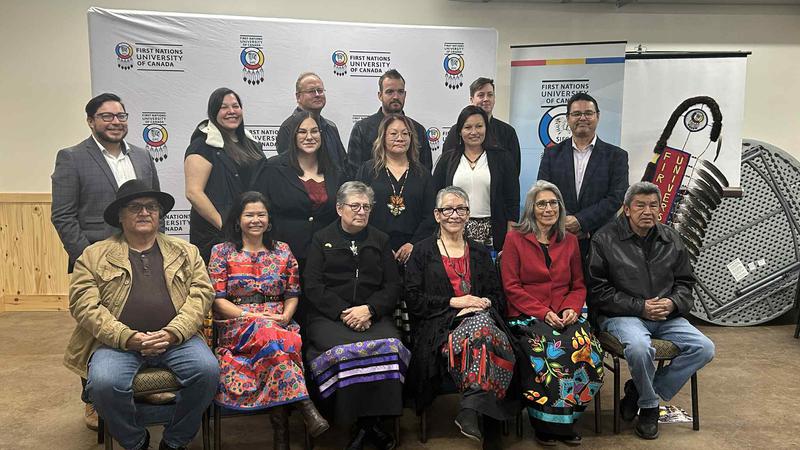Education
FNUniv Enhances Learning Environment with $3.4 Million Upgrades

The First Nations University of Canada (FNUniv) announced significant upgrades to its nēwoskan Traditional Campus, a land-based learning environment located approximately 30 kilometres south of Prince Albert, Saskatchewan. On October 22, 2025, FNUniv celebrated the completion of these enhancements, which totaled $3.4 million. The investment aims to improve the educational experience for students, Elders, and Knowledge Keepers engaged in Indigenous social work, education, language culture camps, and traditional teachings.
FNUniv President Jacqueline Ottmann emphasized the importance of the site, which spans 22 acres along the South Saskatchewan River. “This location is very important for the university, and, of course, it has to do with the spiritual connection,” she stated. The campus has been operational since 2021, serving as a vital resource for nurturing Indigenous identity and promoting healing through traditional practices.
The upgrades included renovations to the mess hall, the installation of a new kitchen, improvements to water and wastewater infrastructure, and the addition of showers and air conditioning units for students. An enclosed sweat lodge was also constructed, enhancing the space for spiritual and cultural ceremonies. Funding for the project came from both the federal and provincial governments, which contributed $2.4 million through the Canada Infrastructure Program, while FNUniv invested $1 million.
“Learning from the environment allows students to disconnect from cities and engage in meaningful ways with each other,” Ottmann noted. “They can listen to the coyotes at night, see the brilliance of the stars, and be open to healing in various ways.” The focus on land-based learning is designed to foster a deeper understanding of Indigenous ways of knowing and being.
In addition to traditional teachings, students at nēwoskan also learn about environmental stewardship and sustainability. The campus’s natural setting helps students overcome distractions that may hinder their learning experiences. Ottmann stated, “First Nations University represents a decolonized approach to teaching and learning and research. It’s not only decolonized; it’s Indigenous.”
The upgrades represent a significant step toward healing the historical traumas faced by Indigenous peoples. “As Murray Sinclair said, ‘Education got us into this mess, and it should get us out,’ and that’s our role here,” Ottmann added.
The celebration of these enhancements marks a pivotal moment for FNUniv, reinforcing its commitment to creating an inclusive and enriching educational environment rooted in Indigenous culture and traditions. The nēwoskan Traditional Campus continues to serve as a cornerstone for community engagement and cultural revitalization, ensuring that students have the opportunity to learn and grow in a supportive, land-based setting.
-

 Education3 months ago
Education3 months agoBrandon University’s Failed $5 Million Project Sparks Oversight Review
-

 Science4 months ago
Science4 months agoMicrosoft Confirms U.S. Law Overrules Canadian Data Sovereignty
-

 Lifestyle3 months ago
Lifestyle3 months agoWinnipeg Celebrates Culinary Creativity During Le Burger Week 2025
-

 Health4 months ago
Health4 months agoMontreal’s Groupe Marcelle Leads Canadian Cosmetic Industry Growth
-

 Science4 months ago
Science4 months agoTech Innovator Amandipp Singh Transforms Hiring for Disabled
-

 Technology4 months ago
Technology4 months agoDragon Ball: Sparking! Zero Launching on Switch and Switch 2 This November
-

 Education4 months ago
Education4 months agoRed River College Launches New Programs to Address Industry Needs
-

 Technology4 months ago
Technology4 months agoGoogle Pixel 10 Pro Fold Specs Unveiled Ahead of Launch
-

 Business3 months ago
Business3 months agoRocket Lab Reports Strong Q2 2025 Revenue Growth and Future Plans
-

 Technology2 months ago
Technology2 months agoDiscord Faces Serious Security Breach Affecting Millions
-

 Education4 months ago
Education4 months agoAlberta Teachers’ Strike: Potential Impacts on Students and Families
-

 Science4 months ago
Science4 months agoChina’s Wukong Spacesuit Sets New Standard for AI in Space
-

 Education3 months ago
Education3 months agoNew SĆIȺNEW̱ SṮEȽIṮḴEȽ Elementary Opens in Langford for 2025/2026 Year
-

 Technology4 months ago
Technology4 months agoWorld of Warcraft Players Buzz Over 19-Quest Bee Challenge
-

 Business4 months ago
Business4 months agoNew Estimates Reveal ChatGPT-5 Energy Use Could Soar
-

 Business4 months ago
Business4 months agoDawson City Residents Rally Around Buy Canadian Movement
-

 Business4 months ago
Business4 months agoBNA Brewing to Open New Bowling Alley in Downtown Penticton
-

 Technology2 months ago
Technology2 months agoHuawei MatePad 12X Redefines Tablet Experience for Professionals
-

 Technology4 months ago
Technology4 months agoFuture Entertainment Launches DDoD with Gameplay Trailer Showcase
-

 Technology4 months ago
Technology4 months agoGlobal Launch of Ragnarok M: Classic Set for September 3, 2025
-

 Technology4 months ago
Technology4 months agoInnovative 140W GaN Travel Adapter Combines Power and Convenience
-

 Top Stories3 months ago
Top Stories3 months agoBlue Jays Shift José Berríos to Bullpen Ahead of Playoffs
-

 Science4 months ago
Science4 months agoXi Labs Innovates with New AI Operating System Set for 2025 Launch
-

 Technology4 months ago
Technology4 months agoNew IDR01 Smart Ring Offers Advanced Sports Tracking for $169










